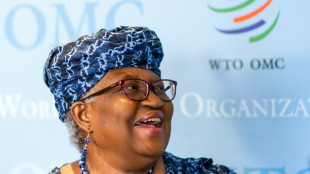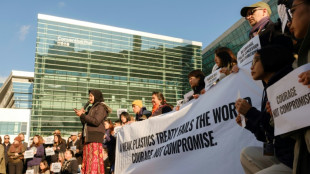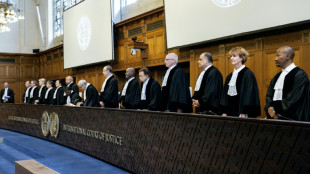
-
 Attack-minded Spurs boss Postecoglou says: 'You'll miss me when I'm gone'
Attack-minded Spurs boss Postecoglou says: 'You'll miss me when I'm gone'
-
Syria jihadists, allies shell major city Aleppo in shock offensive

-
 Macron inspects 'sublime' Notre Dame after reconstruction
Macron inspects 'sublime' Notre Dame after reconstruction
-
Arsenal must be near-perfect to catch Liverpool, says Arteta

-
 Arrests, intimidation stoke fear in Pakistan's politics
Arrests, intimidation stoke fear in Pakistan's politics
-
Showdown looms on plastic treaty days before deadline

-
 Ngozi Okonjo-Iweala: the WTO's trailblazing motivator
Ngozi Okonjo-Iweala: the WTO's trailblazing motivator
-
WTO chief reappointed as Trump threat looms

-
 US landmine offer to Ukraine throws treaty into 'crisis': campaign group
US landmine offer to Ukraine throws treaty into 'crisis': campaign group
-
British MPs debate contentious assisted dying law

-
 Macron offers first glimpse of post-fire Notre Dame
Macron offers first glimpse of post-fire Notre Dame
-
Syria jihadists, allies shell Aleppo in shock offensive

-
 Japan government approves $92 bn extra budget
Japan government approves $92 bn extra budget
-
Toll in Syria jihadist-army fighting rises to 242: monitor

-
 UK transport secretary quits in setback for Starmer
UK transport secretary quits in setback for Starmer
-
Days before deadline, plastic treaty draft highlights disagreement

-
 Crypto boss eats banana art he bought for $6.2 million
Crypto boss eats banana art he bought for $6.2 million
-
Teen news boss criticises Australian social media ban

-
 Taiwan detects 41 Chinese military aircraft, ships ahead of Lai US stopover
Taiwan detects 41 Chinese military aircraft, ships ahead of Lai US stopover
-
Spain urged to 'build differently' after deadly floods

-
 WTO chief faces heavy task as Trump threat looms
WTO chief faces heavy task as Trump threat looms
-
Herbert takes control at Australian Open as Smith tanks

-
 Israel PM again warns Iran after top diplomat talks of revising nuclear doctrine
Israel PM again warns Iran after top diplomat talks of revising nuclear doctrine
-
Brilliant Brook's 132 puts England on top against sloppy New Zealand

-
 Brilliant Brook's 132 puts England on top against New Zealand
Brilliant Brook's 132 puts England on top against New Zealand
-
US landmine offer to Ukraine throws global treaty into 'crisis': campaign group

-
 Singapore hangs 4th person in three weeks
Singapore hangs 4th person in three weeks
-
Five things to know about NewJeans' shock split from agency

-
 Waste pickers battle for recognition at plastic treaty talks
Waste pickers battle for recognition at plastic treaty talks
-
Ireland votes in closely fought general election

-
 Top UN court to open unprecedented climate hearings
Top UN court to open unprecedented climate hearings
-
European countries that allow assisted dying

-
 British MPs to debate contentious assisted dying law
British MPs to debate contentious assisted dying law
-
Schmidt not expecting hero's welcome on Ireland return

-
 PSG stuck between domestic dominance and Champions League woes
PSG stuck between domestic dominance and Champions League woes
-
'Hot fight' as unbeaten Bayern visit Dortmund fortress

-
 Bordeaux-Begles' Samu 'not finished yet' with Wallabies
Bordeaux-Begles' Samu 'not finished yet' with Wallabies
-
Brook and Pope half-centuries haul England to 174-4 against NZ

-
 Yen rallies on rate hike bets as equity markets swing
Yen rallies on rate hike bets as equity markets swing
-
Ukraine superstar Mahuchikh brings 'good vibes' to her war-torn country

-
 PlayStation at 30: How Sony's grey box conquered gaming
PlayStation at 30: How Sony's grey box conquered gaming
-
Saudi Arabia hosts UN talks on drought, desertification

-
 PlayStation: Fun facts to know as Sony's console turns 30
PlayStation: Fun facts to know as Sony's console turns 30
-
Nepal's first transgender candidates run for local office

-
 Father of PlayStation says 'everyone told us we would fail'
Father of PlayStation says 'everyone told us we would fail'
-
Ireland seek to overcome former coach Schmidt's Wallabies

-
 Detroit survive Bears comeback to make it 10 wins in a row
Detroit survive Bears comeback to make it 10 wins in a row
-
Mexican actor Silvia Pinal dead at 93

-
 'Black Friday' deals target inflation-weary US consumers
'Black Friday' deals target inflation-weary US consumers
-
Liverpool look to deepen Man City crisis, Amorim seeks first Premier League win


Defying warnings, Jews embark on Ukraine pilgrimage
Thousands of Israeli ultra-Orthodox Jews have vowed to brave the dangers of Russia's invasion of Ukraine and make a pilgrimage there during the Jewish new year, Rosh Hashana.
Among those who said they would not be deterred by the war or by government travel warnings and head to the Ukrainian city of Uman was Avraham Burstein, 51, a musician and actor.
"It is like being in love, I simply have to go," he said as he tuned his accordion at his Yiddish music school in Jerusalem.
Burstein has travelled to Uman, some 200 kilometres (125 miles) south of Kyiv, every year since 1989, only missing the pilgrimage once, in 2020, when the Covid pandemic shut down international travel.
That year he still attempted to enter Ukraine and "tried from eight different countries", he chuckled, insisting that this year he would make it to Uman for the holiday which begins on September 25.
Most of those travelling are, like Burstein, members of the Breslov branch of haredi Judaism, loyal followers of Rabbi Nachman, from Bratslav in modern-day Ukraine, who died in 1810.
Nachman was the founder of an ultra-Orthodox movement that settled in Uman in the early 1800s. Before his death, he asked that his followers visit his tomb to celebrate Jewish holidays.
"For us, it would be nice if he was buried in London, or in Amsterdam, even in Berlin," said Burstein. "But he chose to be there, and he asked us to come every year for Rosh Hashana, so we have to go."
- 'Let me go' -
The pilgrimage was greatly suppressed during the era of the Soviet Union, and it was only after its collapse in 1991 that the annual visits began to balloon into the tens of thousands.
"All my life growing up, I prayed to God: please one time let me go to Rabbi Nachman's grave, just one time," said Burstein.
"It was so difficult" because of the stringent Soviet restrictions on entry, he said. "North Korea was easier to go to. It was like the moon."
Though he said he had not yet booked his ticket, Burstein planned to travel later this week with his two sons.
Israeli Prime Minister Yair Lapid this month urged citizens to avoid Uman, warning of a "life-threatening danger", and the Ukranian embassy in Israel last week issued a similar warning.
Uman was badly hit by Russian missiles in the early weeks of the war, and just last month a civilian was killed by a Russian missile in the district, according to a statement from a regional official, Ihor Taburets, posted on messaging service Telegram.
Burstein said he could "understand the prime minister and president asking us not to go -- they are responsible for the security of the people".
But he argued that, given the frequent security incidents in his home country, "if you are coming from Israel, you don't worry about the danger".
- Sold-out flights -
Direct flights to Kyiv have been cancelled since the Russian invasion of Ukraine began, yet thousands of pilgrims have already set out on their journeys.
One haredi travel agent in Jerusalem, who asked not to be named for fear of rebuke in the community, said flights to countries bordering Ukraine had largely sold out for the rest of the month.
At Tel Aviv's Ben Gurion Airport last week, flights to Moldova and Romania were packed with Breslov haredim heading for Uman.
"Why should we be worried? If you believe in God you're not afraid of anything," Avraham Elbaz told AFP as he checked in for his flight to the Moldovan capital Chisinau.
In September 2020, thousands of ultra-Orthodox Jews were trapped for days between the borders of Belarus and Ukraine after Kyiv refused to allow them entry due to the Covid pandemic.
Before the pandemic, more than 50,000 pilgrims travelled annually during Rosh Hashana, said Gilad Malach, director of the Ultra-Orthodox in Israel programme at the Israel Democracy Institute think-tank.
He estimated that anywhere between 5,000 and 10,000 pilgrims would attempt the journey this year.
"The majority, when there are restrictions, understand the reasons not to go, whether that is Covid-19 or the war," Malach told AFP.
"But for the hardcore hasidim, it's one of the basic commitments that they have," he added, saying their belief is that "you should do anything to get there".
"The more it is forbidden or hard, the more you are appreciated as a follower if you succeed in overcoming the obstacles and visiting the grave."
For Burstein, the war has only heightened the journey's importance.
"We hope that because of our prayer there, we can bring peace to the world," he said.
F.Pavlenko--BTB
